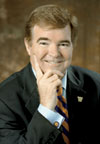
Like other alumni, friends and supporters of our University, I am thrilled when the University of Washington receives recognition for its exemplary performance. So when an article in The Economist last September reported that the UW ranked twentieth among the world’s top universities, I was delighted. Since that time, the rankings have been updated, and the UW now ranks even higher, coming in at number seventeen.

Being ranked among the top 20 universities in the world obviously is a tremendous achievement. Our students, faculty and staff work extremely hard and perform at a truly exceptional level, so it is very rewarding to see their efforts recognized as world-class. But while it is exciting to see our reputation catch up to our quality, we must not lose sight of what is really important. We must not allow the central mission of our University, and our real accomplishments, to be lost in a swirl of rhetoric about numbers and rankings. Great universities create futures by transforming people’s lives. That is our central mission, a mission that must remain foremost in all that we do.
For our students, fulfilling our mission means ensuring that our educational processes are not merely additive, but are truly transformative. This University changed the direction of my life, and it should do the same for every student who comes here. Aspirations should be elevated, ways to see and think about the world expanded, and minds sharpened. Attending a global top-20 university may be a source of pride for our students, but seeing the interconnection of ideas across time and space, being a part of the discovery and creation that is characteristic of a great research enterprise, connecting to the society around us—these are the things that lead to a lifetime of growth, opportunity and engagement. And that is the true value of a UW education.

Research—one of the key areas that propels us forward in the rankings—is also crucial to our mission to create futures and transform lives. While many fine universities can work on pieces of problems, the UW is one of the very few places that can tackle the biggest, most complex and challenging questions of our time. Our outstanding corps of scientists—Nobel laureates, National Academy of Science members and Presidential award winners—possess the knowledge, talent and creativity needed to conduct leading-edge, life-changing research. Their work leads to cures for the most debilitating diseases, new technologies that revolutionize industries, and new practices that help us sustain our increasingly fragile environment—monumental breakthroughs that transform and improve the lives of all citizens.
Today’s problems do not fit into discrete disciplinary boundaries. Solutions can only come from collaboration across intellectual boundaries and traditions: scientists and humanists working together. Therefore, our exceptionally strong culture of interdisciplinarity and collegiality adds a special dimension to our mission, according us the opportunity to find answers and innovation in somewhat unexpected places. In addition to improving the quality of life for all, the arts and humanities can provide inspiration and insight into those issues with which our society is grappling. By connecting science and humanistic understanding, we leverage our capacity to respond to large-scale problems with solutions that work for us now and in the future.
Next fall, a new spate of university rankings will emerge. I sincerely hope that the UW continues to improve its standing. More importantly, though, I hope we move forward in our mission to create futures and transform the lives of all of Washington’s citizens.
Mark A. Emmert, ’75
President